Using moodle quiz to assist listening assessment: Efl students' perceptions and suggestions
here is no doubt that technology plays a significant role in education, especially in language
teaching and learning. Not only does the advent of technological advances significantly support teachers
and learners in acquiring new languages, but it also facilitates the process of language testing and
assessment. At the University of Foreign Languages, Hue University, traditional paper-based tests have
been long used to assess students’ learning progress. More specifically, in assessing students’ listening
comprehension ability, tests are always created in paper-and-pencil format and delivered to students who
are normally arranged in a brick-and-mortar setting. While the listening audio file is usually played by a
CD player or a cassette, students attentively listen and provide the answers on the test paper. This way of
test delivery has posed many difficulties to students as the quality of the sound is low, so it is hard for
students to perform well in the test. Moreover, the traditional test takes teachers a great deal of time to mark
and students a long time to receive their results and feedback. In order to eliminate these difficulties as well
as innovate the way listening skills are tested, in this study, the researcher has applied Moodle Quiz to
convert paper-based listening tests into web-based versions and deliver listening tests to students through
computers in computer labs and personal devices. The research, therefore, aimed to discover what students
thought about Moodle-based listening quizzes and what advantages as well as disadvantages they had when
taking listening tests on Moodle.
This study, therefore, aims to seek the answers to the following questions:
1. What is students’ perception of the use of Moodle Quiz in assessing listening skills?
2. What advantages and disadvantages did Moodle-based listening tests offer students?
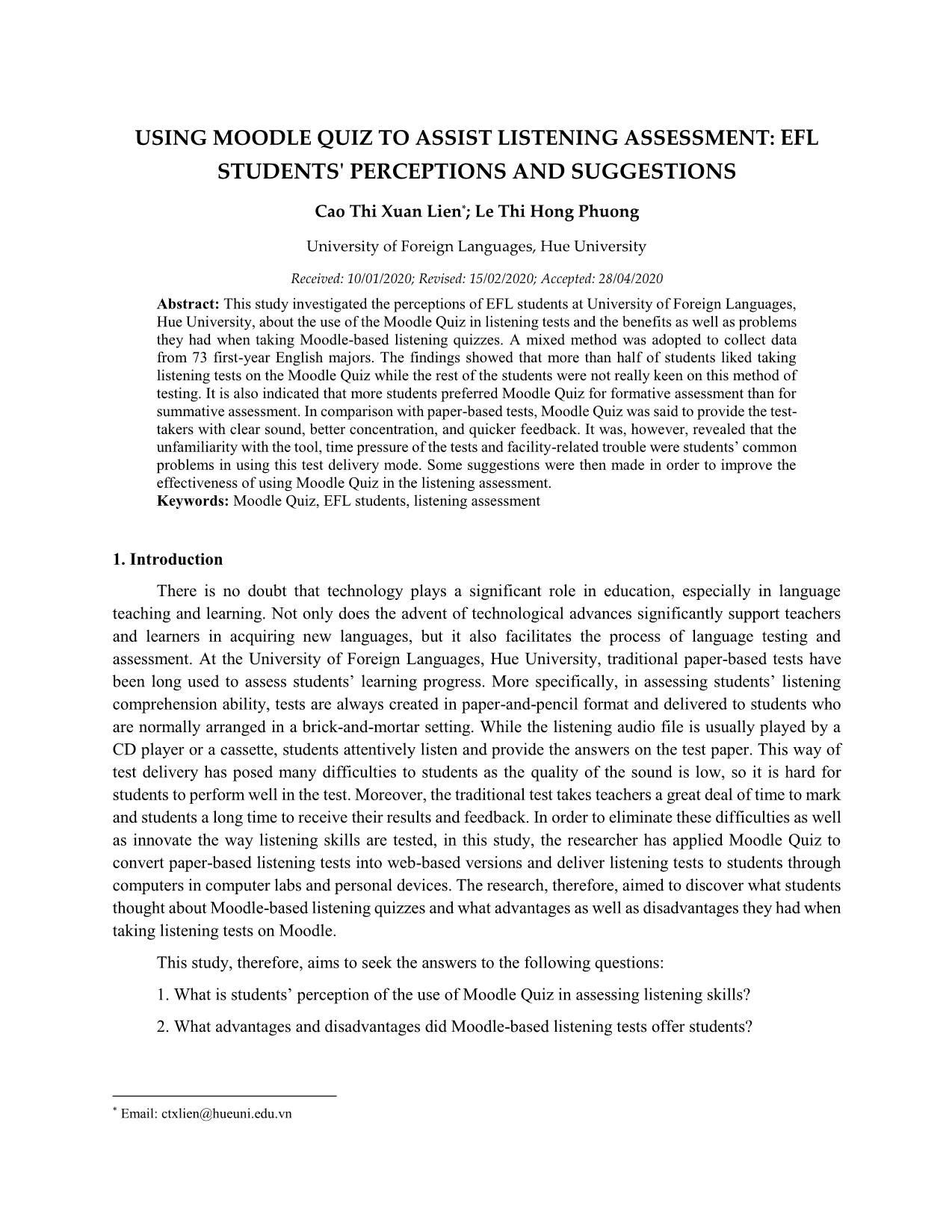
Trang 1
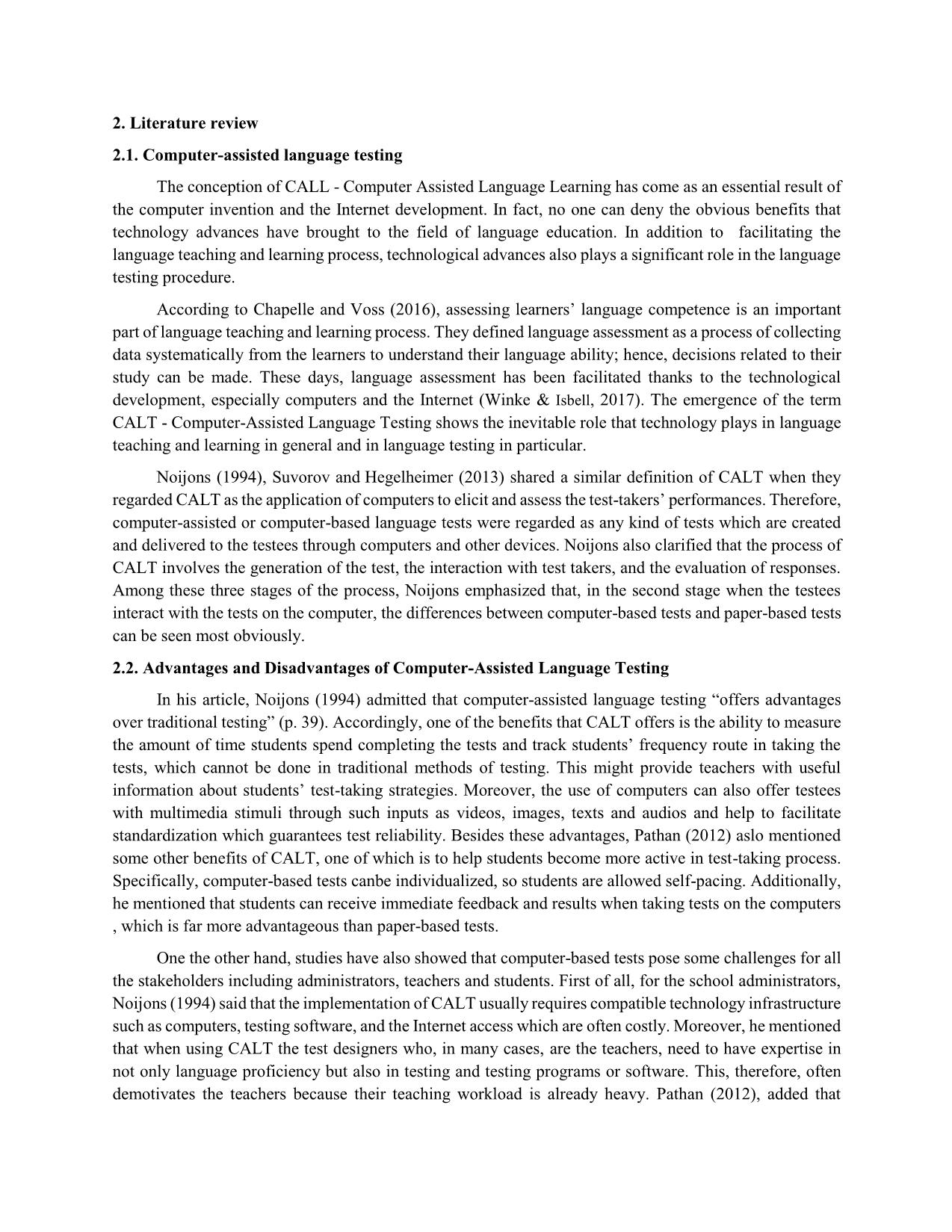
Trang 2
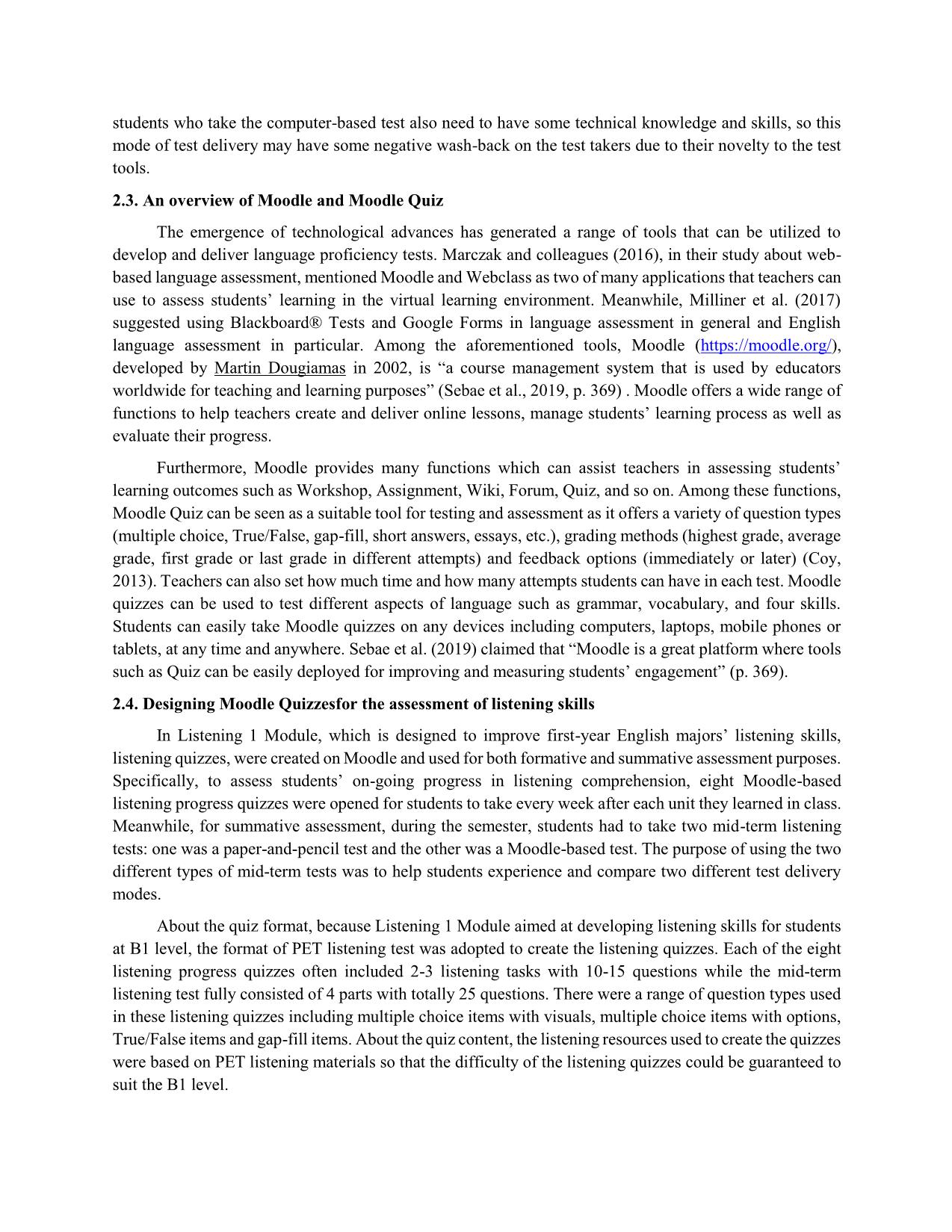
Trang 3
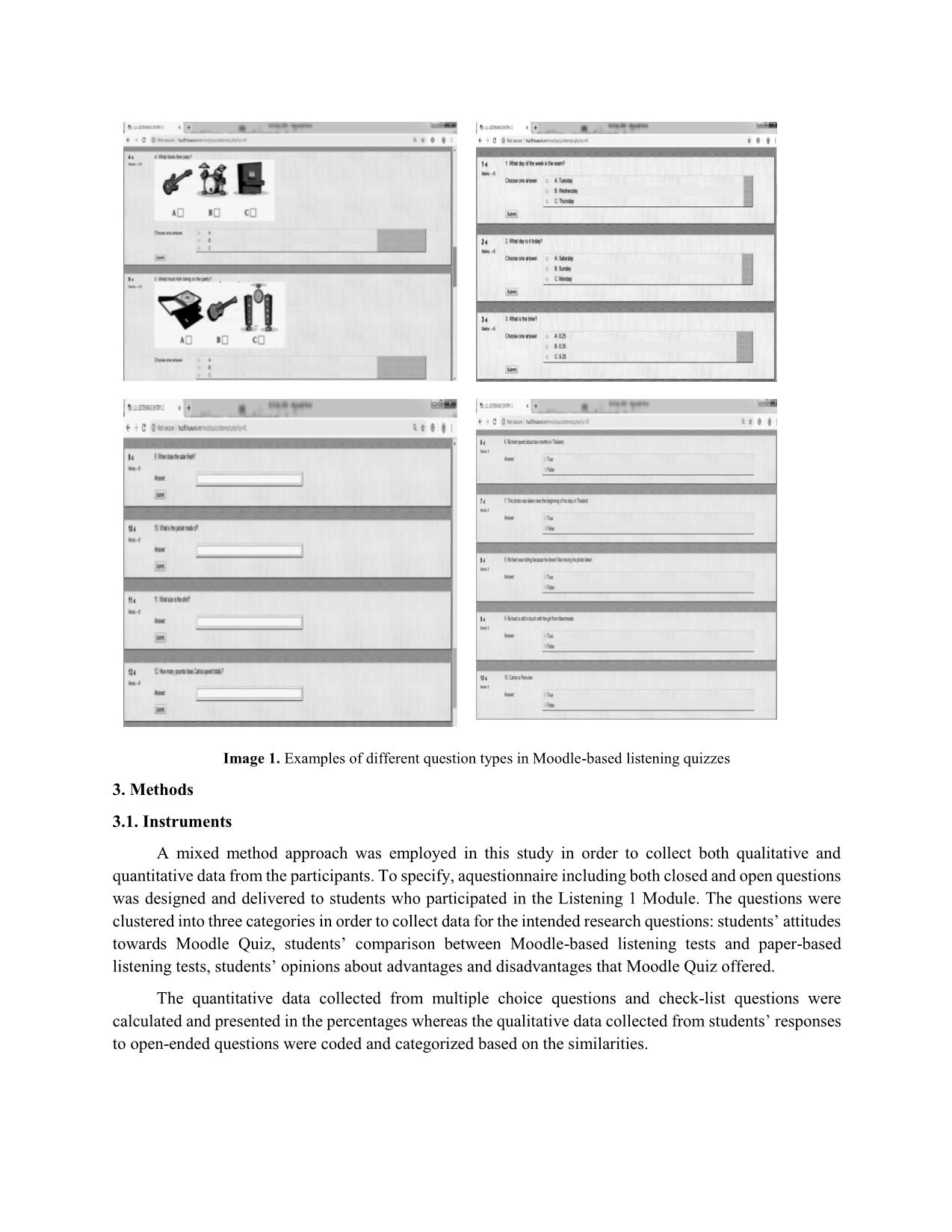
Trang 4
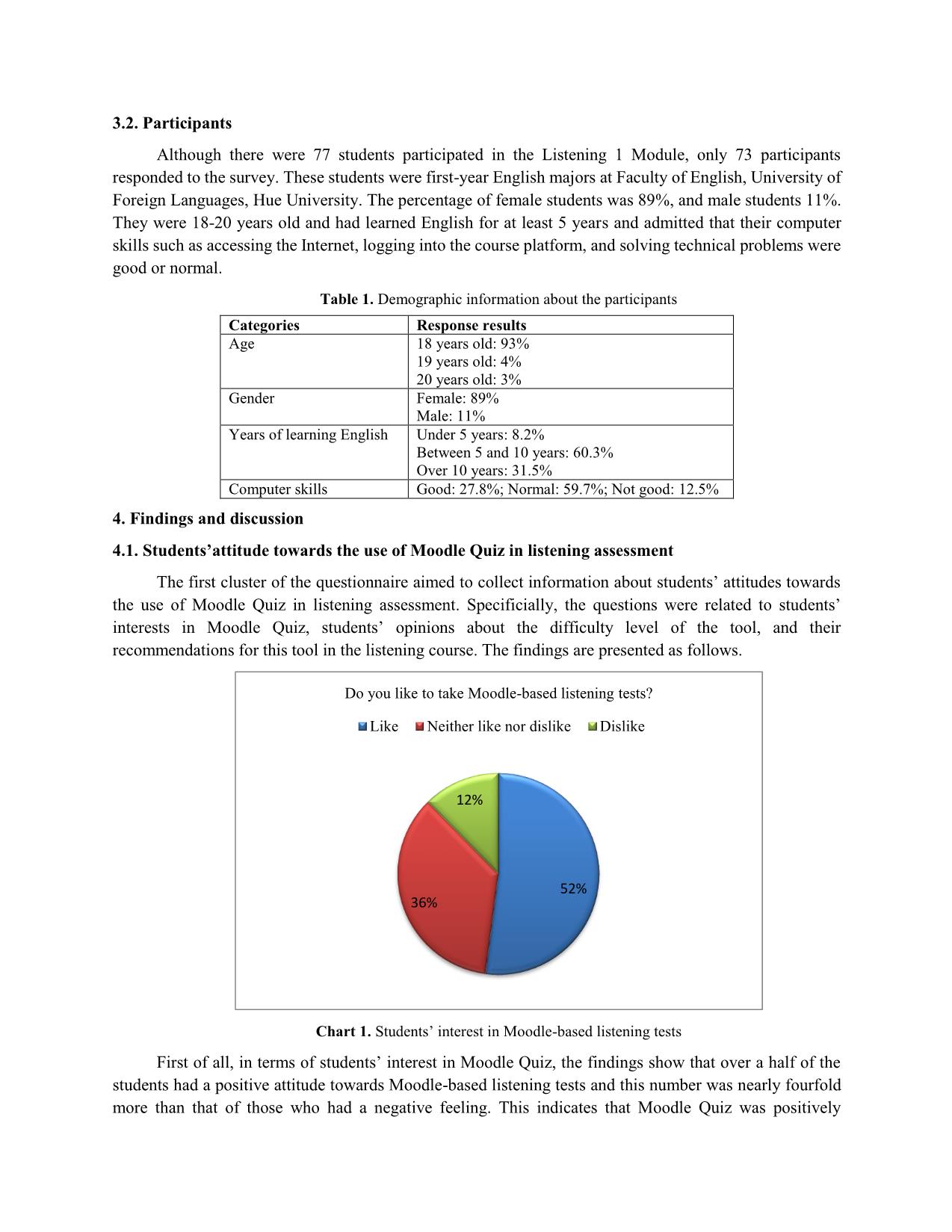
Trang 5
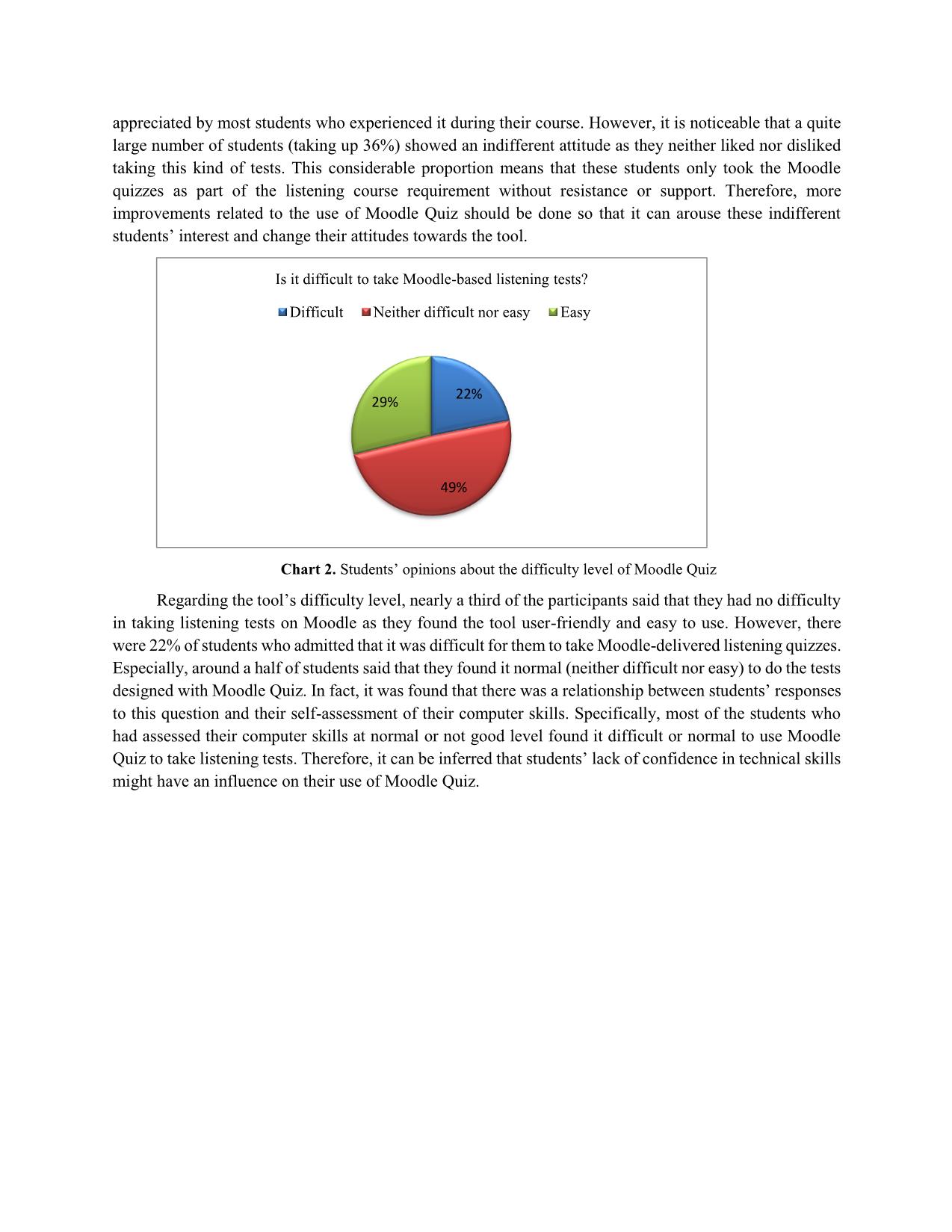
Trang 6
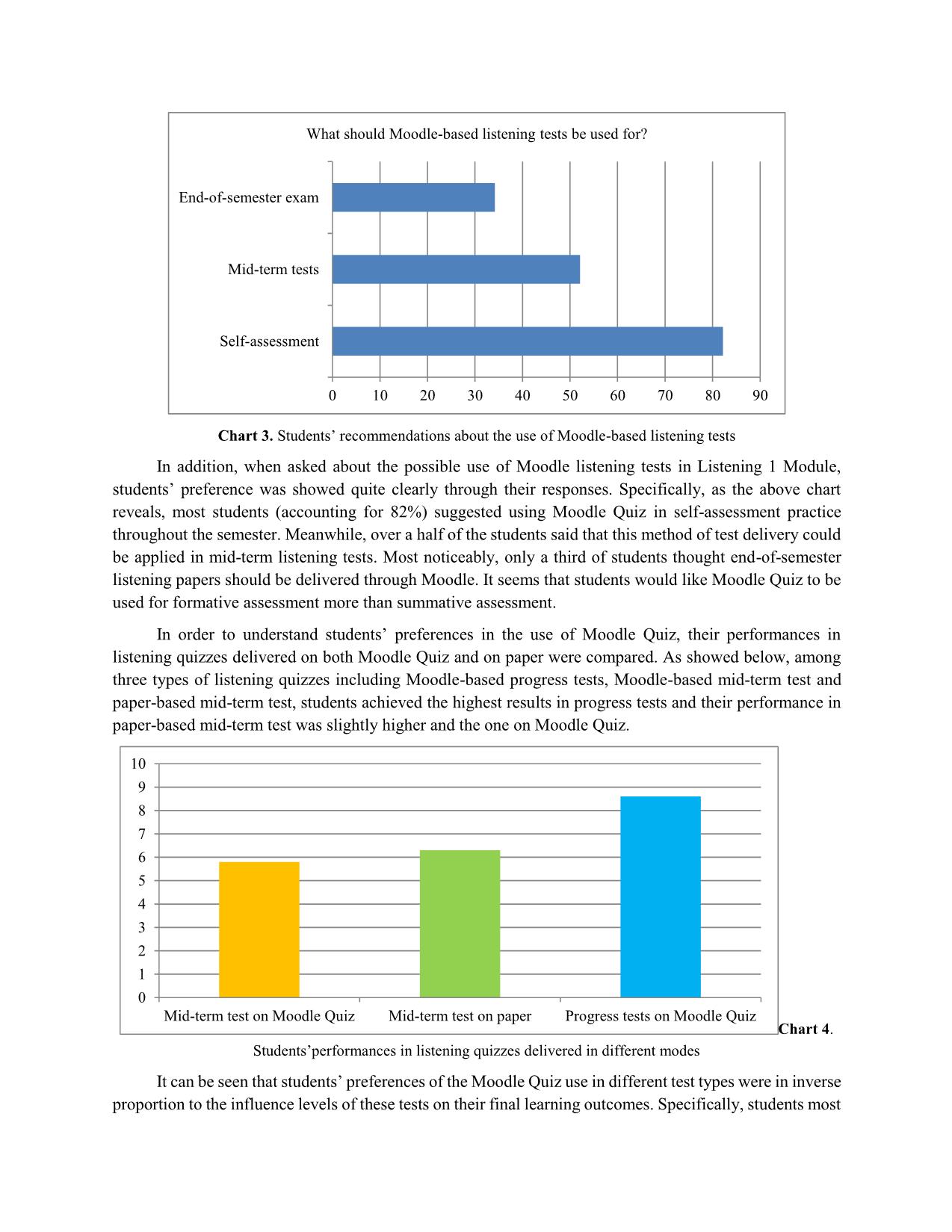
Trang 7
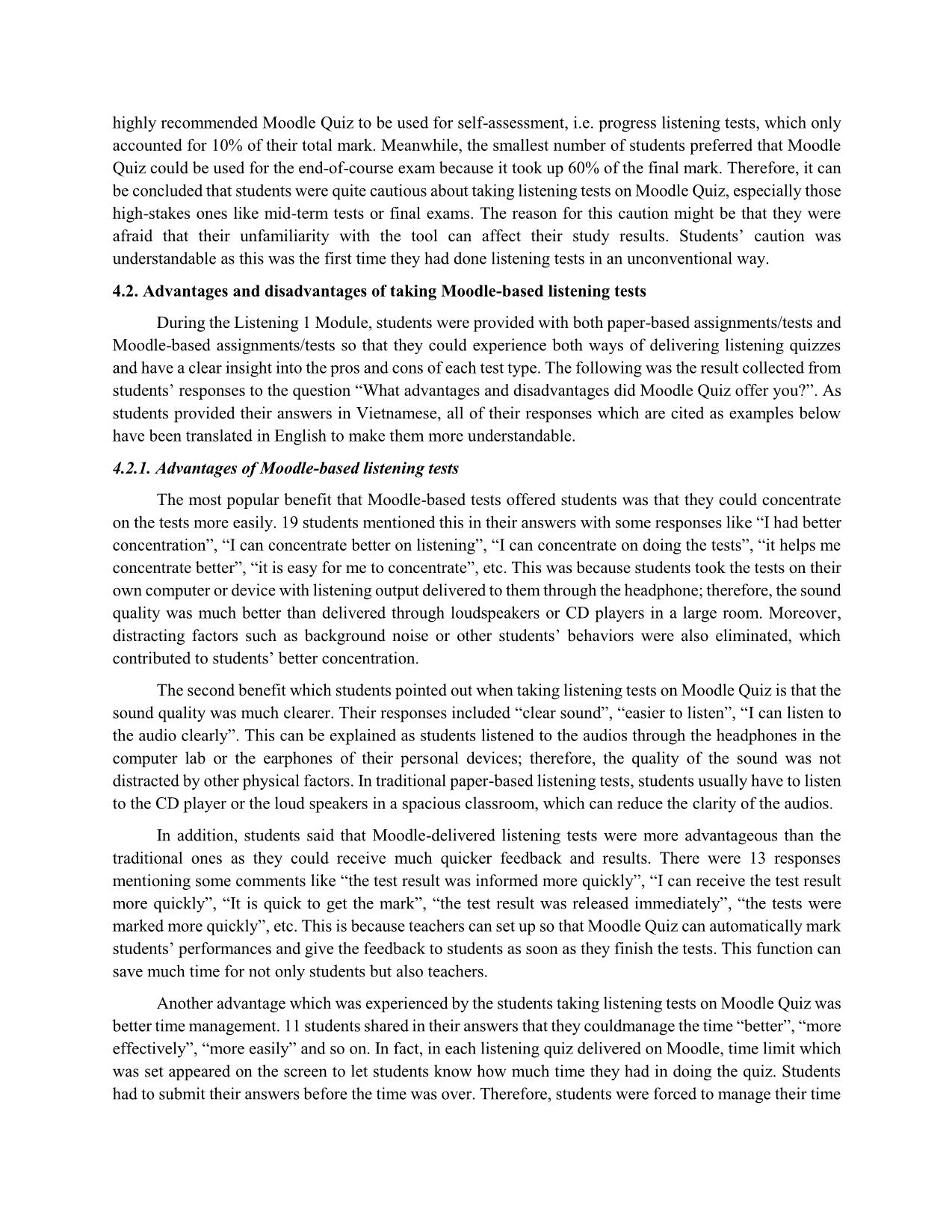
Trang 8
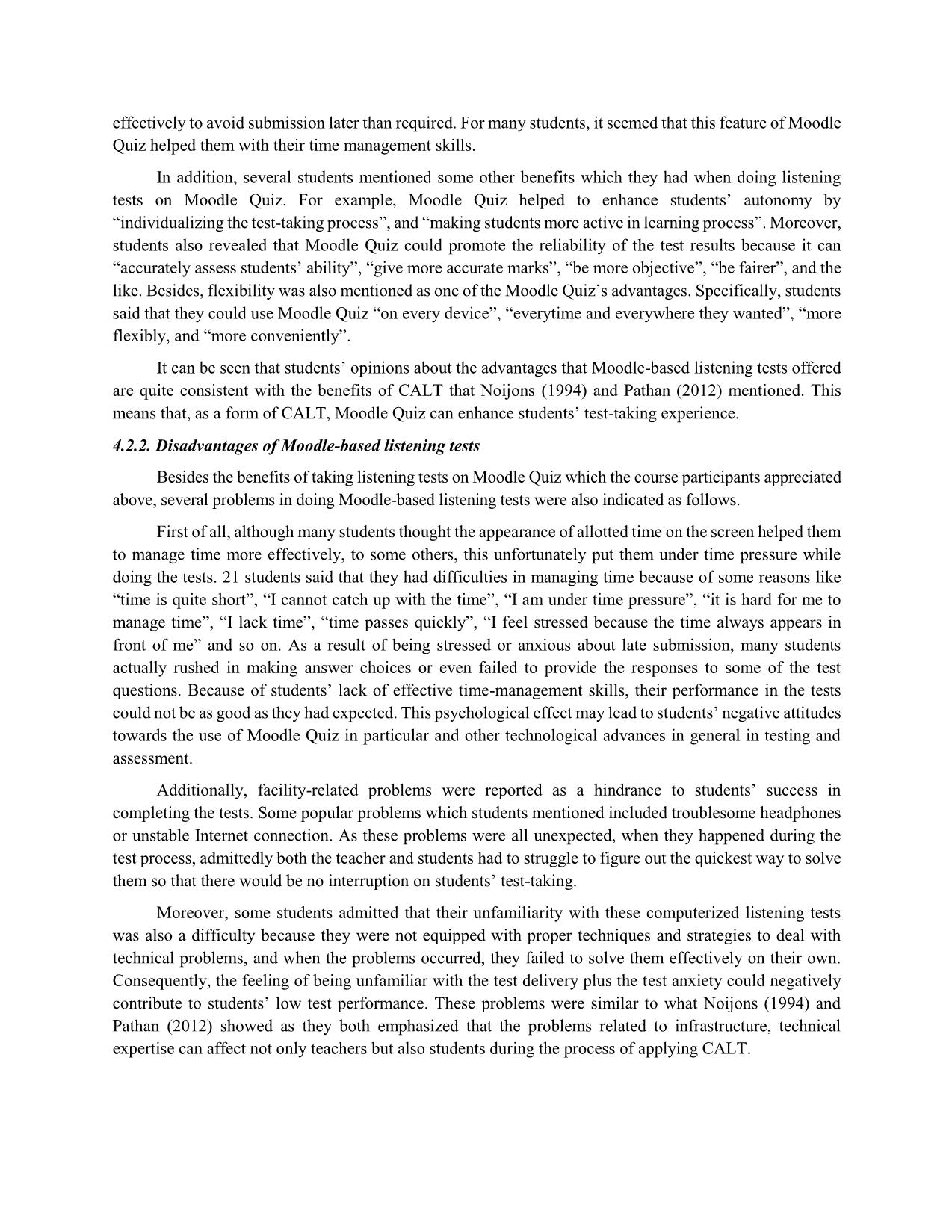
Trang 9
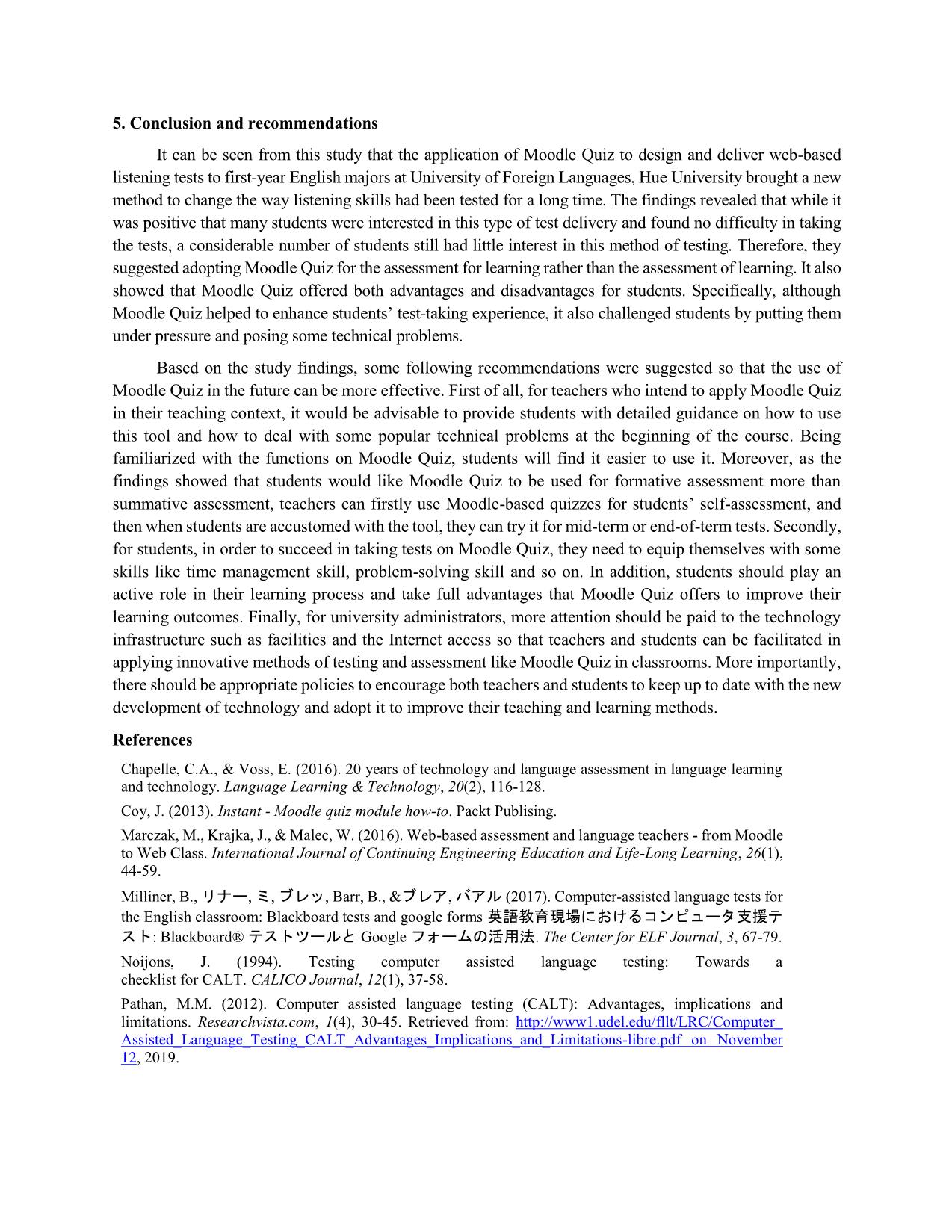
Trang 10
Tải về để xem bản đầy đủ
Tóm tắt nội dung tài liệu: Using moodle quiz to assist listening assessment: Efl students' perceptions and suggestions
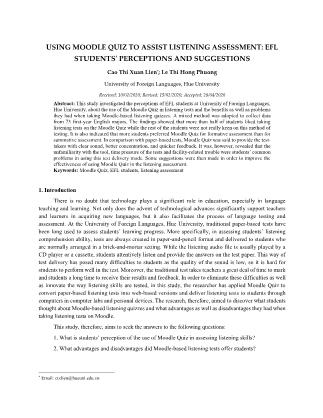
USING MOODLE QUIZ TO ASSIST LISTENING ASSESSMENT: EFL STUDENTS' PERCEPTIONS AND SUGGESTIONS Cao Thi Xuan Lien*; Le Thi Hong Phuong University of Foreign Languages, Hue University Received: 10/01/2020; Revised: 15/02/2020; Accepted: 28/04/2020 Abstract: This study investigated the perceptions of EFL students at University of Foreign Languages, Hue University, about the use of the Moodle Quiz in listening tests and the benefits as well as problems they had when taking Moodle-based listening quizzes. A mixed method was adopted to collect data from 73 first-year English majors. The findings showed that more than half of students liked taking listening tests on the Moodle Quiz while the rest of the students were not really keen on this method of testing. It is also indicated that more students preferred Moodle Quiz for formative assessment than for summative assessment. In comparison with paper-based tests, Moodle Quiz was said to provide the test- takers with clear sound, better concentration, and quicker feedback. It was, however, revealed that the unfamiliarity with the tool, time pressure of the tests and facility-related trouble were students’ common problems in using this test delivery mode. Some suggestions were then made in order to improve the effectiveness of using Moodle Quiz in the listening assessment. Keywords: Moodle Quiz, EFL students, listening assessment 1. Introduction There is no doubt that technology plays a significant role in education, especially in language teaching and learning. Not only does the advent of technological advances significantly support teachers and learners in acquiring new languages, but it also facilitates the process of language testing and assessment. At the University of Foreign Languages, Hue University, traditional paper-based tests have been long used to assess students’ learning progress. More specifically, in assessing students’ listening comprehension ability, tests are always created in paper-and-pencil format and delivered to students who are normally arranged in a brick-and-mortar setting. While the listening audio file is usually played by a CD player or a cassette, students attentively listen and provide the answers on the test paper. This way of test delivery has posed many difficulties to students as the quality of the sound is low, so it is hard for students to perform well in the test. Moreover, the traditional test takes teachers a great deal of time to mark and students a long time to receive their results and feedback. In order to eliminate these difficulties as well as innovate the way listening skills are tested, in this study, the researcher has applied Moodle Quiz to convert paper-based listening tests into web-based versions and deliver listening tests to students through computers in computer labs and personal devices. The research, therefore, aimed to discover what students thought about Moodle-based listening quizzes and what advantages as well as disadvantages they had when taking listening tests on Moodle. This study, therefore, aims to seek the answers to the following questions: 1. What is students’ perception of the use of Moodle Quiz in assessing listening skills? 2. What advantages and disadvantages did Moodle-based listening tests offer students? * Email: ctxlien@hueuni.edu.vn 2. Literature review 2.1. Computer-assisted language testing The conception of CALL - Computer Assisted Language Learning has come as an essential result of the computer invention and the Internet development. In fact, no one can deny the obvious benefits that technology advances have brought to the field of language education. In addition to facilitating the language teaching and learning process, technological advances also plays a significant role in the language testing procedure. According to Chapelle and Voss (2016), assessing learners’ language competence is an important part of language teaching and learning process. They defined language assessment as a process of collecting data systematically from the learners to understand their language ability; hence, decisions related to their study can be made. These days, language assessment has been facilitated thanks to the technological development, especially computers and the Internet (Winke & Isbell, 2017). The emergence of the term CALT - Computer-Assisted Language Testing shows the inevitable role that technology plays in language teaching and learning in general and in language testing in particular. Noijons (1994), Suvorov and Hegelheimer (2013) shared a similar definition of CALT when they regarded CALT as the application of computers to elicit and assess the test-takers’ performances. Therefore, computer-assisted or computer-based language tests were regarded as any kind of tests which are created and delivered to the testees through computers and other devices. Noijons also clarified that ... y a third of students thought end-of-semester listening papers should be delivered through Moodle. It seems that students would like Moodle Quiz to be used for formative assessment more than summative assessment. In order to understand students’ preferences in the use of Moodle Quiz, their performances in listening quizzes delivered on both Moodle Quiz and on paper were compared. As showed below, among three types of listening quizzes including Moodle-based progress tests, Moodle-based mid-term test and paper-based mid-term test, students achieved the highest results in progress tests and their performance in paper-based mid-term test was slightly higher and the one on Moodle Quiz. Chart 4. Students’performances in listening quizzes delivered in different modes It can be seen that students’ preferences of the Moodle Quiz use in different test types were in inverse proportion to the influence levels of these tests on their final learning outcomes. Specifically, students most 0 10 20 30 40 50 60 70 80 90 Self-assessment Mid-term tests End-of-semester exam What should Moodle-based listening tests be used for? 0 1 2 3 4 5 6 7 8 9 10 Mid-term test on Moodle Quiz Mid-term test on paper Progress tests on Moodle Quiz highly recommended Moodle Quiz to be used for self-assessment, i.e. progress listening tests, which only accounted for 10% of their total mark. Meanwhile, the smallest number of students preferred that Moodle Quiz could be used for the end-of-course exam because it took up 60% of the final mark. Therefore, it can be concluded that students were quite cautious about taking listening tests on Moodle Quiz, especially those high-stakes ones like mid-term tests or final exams. The reason for this caution might be that they were afraid that their unfamiliarity with the tool can affect their study results. Students’ caution was understandable as this was the first time they had done listening tests in an unconventional way. 4.2. Advantages and disadvantages of taking Moodle-based listening tests During the Listening 1 Module, students were provided with both paper-based assignments/tests and Moodle-based assignments/tests so that they could experience both ways of delivering listening quizzes and have a clear insight into the pros and cons of each test type. The following was the result collected from students’ responses to the question “What advantages and disadvantages did Moodle Quiz offer you?”. As students provided their answers in Vietnamese, all of their responses which are cited as examples below have been translated in English to make them more understandable. 4.2.1. Advantages of Moodle-based listening tests The most popular benefit that Moodle-based tests offered students was that they could concentrate on the tests more easily. 19 students mentioned this in their answers with some responses like “I had better concentration”, “I can concentrate better on listening”, “I can concentrate on doing the tests”, “it helps me concentrate better”, “it is easy for me to concentrate”, etc. This was because students took the tests on their own computer or device with listening output delivered to them through the headphone; therefore, the sound quality was much better than delivered through loudspeakers or CD players in a large room. Moreover, distracting factors such as background noise or other students’ behaviors were also eliminated, which contributed to students’ better concentration. The second benefit which students pointed out when taking listening tests on Moodle Quiz is that the sound quality was much clearer. Their responses included “clear sound”, “easier to listen”, “I can listen to the audio clearly”. This can be explained as students listened to the audios through the headphones in the computer lab or the earphones of their personal devices; therefore, the quality of the sound was not distracted by other physical factors. In traditional paper-based listening tests, students usually have to listen to the CD player or the loud speakers in a spacious classroom, which can reduce the clarity of the audios. In addition, students said that Moodle-delivered listening tests were more advantageous than the traditional ones as they could receive much quicker feedback and results. There were 13 responses mentioning some comments like “the test result was informed more quickly”, “I can receive the test result more quickly”, “It is quick to get the mark”, “the test result was released immediately”, “the tests were marked more quickly”, etc. This is because teachers can set up so that Moodle Quiz can automatically mark students’ performances and give the feedback to students as soon as they finish the tests. This function can save much time for not only students but also teachers. Another advantage which was experienced by the students taking listening tests on Moodle Quiz was better time management. 11 students shared in their answers that they couldmanage the time “better”, “more effectively”, “more easily” and so on. In fact, in each listening quiz delivered on Moodle, time limit which was set appeared on the screen to let students know how much time they had in doing the quiz. Students had to submit their answers before the time was over. Therefore, students were forced to manage their time effectively to avoid submission later than required. For many students, it seemed that this feature of Moodle Quiz helped them with their time management skills. In addition, several students mentioned some other benefits which they had when doing listening tests on Moodle Quiz. For example, Moodle Quiz helped to enhance students’ autonomy by “individualizing the test-taking process”, and “making students more active in learning process”. Moreover, students also revealed that Moodle Quiz could promote the reliability of the test results because it can “accurately assess students’ ability”, “give more accurate marks”, “be more objective”, “be fairer”, and the like. Besides, flexibility was also mentioned as one of the Moodle Quiz’s advantages. Specifically, students said that they could use Moodle Quiz “on every device”, “everytime and everywhere they wanted”, “more flexibly, and “more conveniently”. It can be seen that students’ opinions about the advantages that Moodle-based listening tests offered are quite consistent with the benefits of CALT that Noijons (1994) and Pathan (2012) mentioned. This means that, as a form of CALT, Moodle Quiz can enhance students’ test-taking experience. 4.2.2. Disadvantages of Moodle-based listening tests Besides the benefits of taking listening tests on Moodle Quiz which the course participants appreciated above, several problems in doing Moodle-based listening tests were also indicated as follows. First of all, although many students thought the appearance of allotted time on the screen helped them to manage time more effectively, to some others, this unfortunately put them under time pressure while doing the tests. 21 students said that they had difficulties in managing time because of some reasons like “time is quite short”, “I cannot catch up with the time”, “I am under time pressure”, “it is hard for me to manage time”, “I lack time”, “time passes quickly”, “I feel stressed because the time always appears in front of me” and so on. As a result of being stressed or anxious about late submission, many students actually rushed in making answer choices or even failed to provide the responses to some of the test questions. Because of students’ lack of effective time-management skills, their performance in the tests could not be as good as they had expected. This psychological effect may lead to students’ negative attitudes towards the use of Moodle Quiz in particular and other technological advances in general in testing and assessment. Additionally, facility-related problems were reported as a hindrance to students’ success in completing the tests. Some popular problems which students mentioned included troublesome headphones or unstable Internet connection. As these problems were all unexpected, when they happened during the test process, admittedly both the teacher and students had to struggle to figure out the quickest way to solve them so that there would be no interruption on students’ test-taking. Moreover, some students admitted that their unfamiliarity with these computerized listening tests was also a difficulty because they were not equipped with proper techniques and strategies to deal with technical problems, and when the problems occurred, they failed to solve them effectively on their own. Consequently, the feeling of being unfamiliar with the test delivery plus the test anxiety could negatively contribute to students’ low test performance. These problems were similar to what Noijons (1994) and Pathan (2012) showed as they both emphasized that the problems related to infrastructure, technical expertise can affect not only teachers but also students during the process of applying CALT. 5. Conclusion and recommendations It can be seen from this study that the application of Moodle Quiz to design and deliver web-based listening tests to first-year English majors at University of Foreign Languages, Hue University brought a new method to change the way listening skills had been tested for a long time. The findings revealed that while it was positive that many students were interested in this type of test delivery and found no difficulty in taking the tests, a considerable number of students still had little interest in this method of testing. Therefore, they suggested adopting Moodle Quiz for the assessment for learning rather than the assessment of learning. It also showed that Moodle Quiz offered both advantages and disadvantages for students. Specifically, although Moodle Quiz helped to enhance students’ test-taking experience, it also challenged students by putting them under pressure and posing some technical problems. Based on the study findings, some following recommendations were suggested so that the use of Moodle Quiz in the future can be more effective. First of all, for teachers who intend to apply Moodle Quiz in their teaching context, it would be advisable to provide students with detailed guidance on how to use this tool and how to deal with some popular technical problems at the beginning of the course. Being familiarized with the functions on Moodle Quiz, students will find it easier to use it. Moreover, as the findings showed that students would like Moodle Quiz to be used for formative assessment more than summative assessment, teachers can firstly use Moodle-based quizzes for students’ self-assessment, and then when students are accustomed with the tool, they can try it for mid-term or end-of-term tests. Secondly, for students, in order to succeed in taking tests on Moodle Quiz, they need to equip themselves with some skills like time management skill, problem-solving skill and so on. In addition, students should play an active role in their learning process and take full advantages that Moodle Quiz offers to improve their learning outcomes. Finally, for university administrators, more attention should be paid to the technology infrastructure such as facilities and the Internet access so that teachers and students can be facilitated in applying innovative methods of testing and assessment like Moodle Quiz in classrooms. More importantly, there should be appropriate policies to encourage both teachers and students to keep up to date with the new development of technology and adopt it to improve their teaching and learning methods. References Chapelle, C.A., & Voss, E. (2016). 20 years of technology and language assessment in language learning and technology. Language Learning & Technology, 20(2), 116-128. Coy, J. (2013). Instant - Moodle quiz module how-to. Packt Publising. Marczak, M., Krajka, J., & Malec, W. (2016). Web-based assessment and language teachers - from Moodle to Web Class. International Journal of Continuing Engineering Education and Life-Long Learning, 26(1), 44-59. Milliner, B., リナー, ミ, ブレッ, Barr, B., &ブレア, バアル (2017). Computer-assisted language tests for the English classroom: Blackboard tests and google forms 英語教育現場におけるコンピュータ支援テ スト: Blackboard® テストツールと Google フォームの活用法. The Center for ELF Journal, 3, 67-79. Noijons, J. (1994). Testing computer assisted language testing: Towards a checklist for CALT. CALICO Journal, 12(1), 37-58. Pathan, M.M. (2012). Computer assisted language testing (CALT): Advantages, implications and limitations. Researchvista.com, 1(4), 30-45. Retrieved from: Assisted_Language_Testing_CALT_Advantages_Implications_and_Limitations-libre.pdf on November 12, 2019. Sebae, A., Rihawi, Z., & Azmat, F. (2019). Moodle quiz: A method for measuring students’ engagement. 15th International CDIO Conference at Aarhus University. Retrieved from: /files/document/file/73.pdf. Suvorov, R., & Hegelheimer, V. (2013). Computer-assisted language testing. In: A.J. Kunnan (Ed), The Companion to Language Assessment (pp. 594-613). Hoboken, NJ, USA: John Wiley & Sons, Inc. Winke, P.M., & Isbell, D.R. (2017). Computer-assisted language assessment. In S. Thorne, & S. May (Eds), Language, Education and Technology. Encyclopedia of Language and Education (3rd edition.) (pp. 1-13). Springer, Cham. SỬ DỤNG MOODLE QUIZ ĐỂ HỖ TRỢ ĐÁNH GIÁ KỸ NĂNG NGHE CHO SINH VIÊN NGÀNH TIẾNG ANH Tóm tắt: Nghiên cứu này nhằm khảo sát nhận thức của sinh viên ngành Tiếng Anh tại Trường Đại học Ngoại ngữ, Đại học Huế về việc sử dụng Moodle Quiz trong các bài kiểm tra nghe và những vấn đề mà họ gặp phải khi làm các bài kiểm tra nghe trên Moodle. Để thu thập số liệu từ 73 sinh viên năm 1 ngành Tiếng Anh, phương pháp nghiên cứu kết hợp giữa định tính và định lượng đã được áp dụng. Nghiên cứu chỉ ra rằng hơn một nửa sinh viên thích làm bài kiểm tra nghe trên Moodle trong khi số còn lại không hào hứng lắm với phương pháp kiểm tra này. Kết quả phân tích cũng chỉ ra rằng sinh viên mong muốn Moodle Quiz được sử dụng để đánh giá quá trình hơn là đánh giá tổng kết. So với phương pháp kiểm tra nghe truyền thống trên giấy, sinh viên cho rằng Moodle Quiz giúp cải thiện chất lượng âm thanh, mức độ tập trung khi làm bài, cũng như thông báo kết quả một cách nhanh chóng. Tuy nhiên, việc chưa quen với công cụ này, cũng như áp lực về thời gian khi làm bài kiểm tra và những trục trặc về thiết bị là những vấn đề mà nhiều sinh viên gặp phải khi sử dụng Moodle Quiz. Từ những kết quả trên, một số đề xuất đã được đưa ra để nhằm cải thiện hiệu quả của việc sử dụng Moodle Quiz trong đánh giá kỹ năng nghe. Từ khóa: Moodle Quiz, sinh viên ngành Tiếng Anh, đánh giá kỹ năng nghe
File đính kèm:
 using_moodle_quiz_to_assist_listening_assessment_efl_student.pdf
using_moodle_quiz_to_assist_listening_assessment_efl_student.pdf

